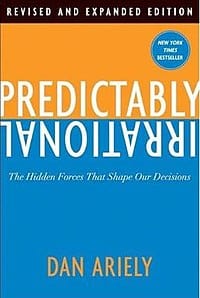This week, we thought we'd resurface one of our first podcast interviews, which explores the human factor behind monetary and fiscal policy. The discussion was recorded back in early 2011, yet correctly anticipated the continued quantitative easing (a.k.a. "money printing") that the world's central banks have engaged in since – because we have a biological bias to "kick the can down the road" when it comes to dealing with debts. The insights within this interview will continue to have relevant predictive power as our leaders increasingly scramble to avoid the repercussions of the endgame to our economic profligacy (for example: Don't bet the farm that a Fed "taper" will actually be implemented). ~ Adam
Looking back at the carnage created by the bursting of the credit bubble, it’s natural to scratch your head and ask How did we ever let that happen? Behavioral economics exists to answer questions like this.
 Chris sat down with Dan Ariely, gallivanting behavioral-economics-researcher-extraordinaire, who is breathing new life into this previously obscure field of study. The resulting interview is full of fresh, non-intuitive insights and shines light on how the human brain is often hard-wired for irrational action when it comes to money.
Chris sat down with Dan Ariely, gallivanting behavioral-economics-researcher-extraordinaire, who is breathing new life into this previously obscure field of study. The resulting interview is full of fresh, non-intuitive insights and shines light on how the human brain is often hard-wired for irrational action when it comes to money.
One of the key takeaways for us was how Dan’s research provides an empirical explanation for why inflation will likely win the day: Our mental programming leads us to prefer behavior that favors it.
Dan has a refreshing, non-traditional way of explaining the more intriguing aspects of human behavior, including:
- The overwhelming influence of emotion in driving our decision-making
- Our vulnerability to present temptations & our overestimation of our future virtuousness
- Our amazing capacity to justify irrational circumstances
- Our blindness to conflicts of interest when they work in our favor
- Why we do a poor job of appreciating future risk
Each of these played a role in the excessive behavior responsible for the credit crisis – and continue to hamper our ability to handle its aftermath rationally today.
Our time with Dan was fun and fascinating. If you’re not acquainted with it already, the perspective offered by behavioral economics is a valuable addition to add to your world view. It definitely has been to ours.
Click the play button below to listen to Chris’ interview with Dan Ariely:
This is a companion discussion topic for the original entry at https://peakprosperity.com/dan-ariely-why-humans-are-hard-wired-to-make-irrational-decisions-around-money/